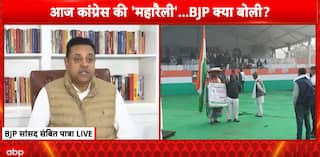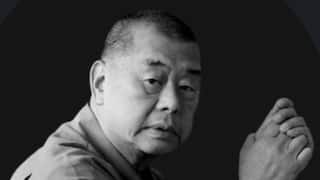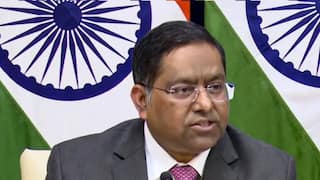'Govt Working To Institutionalise Global Cultural Initiative': PM Modi Inaugurates IAADB 2023
In his nearly 25-minute address, the prime minister underlined the country's rich ancient history in art, culture and architecture, which has drawn people to India from the world over.

Prime Minister Narendra Modi said on Friday that his government is working to institutionalise global cultural initiatives and develop a modern system on the lines of similar events in cities like Venice, London and Sao Paulo.
In his address after inaugurating the first India Art, Architecture and Design Biennale (IAADB) 2023 at the Red Fort, he said such programmes should get a global identity as similar events in some of the world cities.
A lot of work has been going on with a sense of pride to develop places associated with Indian art and architecture, he said, citing the examples of redevelopment and renovation of holy places such as Kashi, Kedarnath and Mahakal Lok.
In his nearly 25-minute address, the prime minister underlined the country's rich ancient history in art, culture and architecture, which has drawn people to India from the world over.
India's vibrant culture and ancient heritage sites attract tourists from all over the world, he said.
"Today, with the sentiment of 'taking pride in our heritage' (virasat par gaurav), the country is again taking it forward...In 'Azadi ka Amrit Kaal', India is charting new dimensions in cultural prosperity, and taking concrete steps for it. This biennale being held in India is an another great step in that direction," Modi said.
The biennale is being helmed by the Ministry of Culture which earlier this year had also organised the International Museum Expo, which was inaugurated by Modi, and Festival of Libraries.
"We also had the Museum Expo (in May) and the Festival of Libraries in August. Through these events our effort is to institutionalise global cultural initiatives and develop a modern system. We want that similar to such events and festivals hosted in Venice, Sao Paulo, Singapore, Sydney, London, these kind of events held in India also get their identity," he said.
The maiden India Art, Architecture and Design Biennale celebrating the rich tapestry of the country's artistic and cultural heritage is being hosted at the historic Red Fort complex here.
Seven "specially curated" thematic pavilions have been set up in the three British-era barracks that have been refurbished for the event.
Prime Minister Modi, prior to inaugurating the mega event in the evening, also visited some of the thematic pavilions.
On the occasion, Modi also unveiled a special commemorative stamp and inaugurated the Atmanirbhar Bharat Centre for Design (ABCD).
The centre is located in the Red Fort premises.
In his opening remarks, Modi said, "This Red Fort itself is very historic. This Red Fort is not just a building, but it is history. From prior to Independence (of India) and beyond, it is steady. I welcome you all to this World Heritage Site." Every country has its landmarks which symbolise its history and values and the capital city of Delhi has many such symbols, he added.
"I saw some of the pavillions here, and exhibits had colours, creativity, culture, and community connect as well," he said.
Modi extolled the artistic legacy and craftsmanship of India and hailed its built heritage, emphasising the skills and engineering used in the construction of stepwells and forts across the country.
Art and culture have been sources of diversity as well as unity, he said, noting that India is the most diverse country. They also connect people and spread harmony, Modi added.
"When my government speak of culture, we welcome all kinds of diversity and support it," he said, adding that India exhibited its diversity through numerous events held during its presidency of the G20.
Art, culture and architecture bloom only in an environment of freedom of ideas as diversity prospers in a culture of debate and dialogue, he said. "We are the most diverse nation in the world but that diversity also binds us together," the prime minister said.
The beginning of "cultural spaces" in the five cities of Delhi, Kolkata, Mumbai, Ahmedabad and Varanasi is a historic start and will enrich them, he said.
Literature, art and music differentiate between humans and other species, Modi added.
He urged people to take time out for a day and visit the biennale.
Large biennale banners have been put up at the venue, which has been decked up colourfully. From ornate doors to magnificent ancient temples and from heritage stepwells to rich textile designs, the art and architectural legacy of India has been showcased at the biennale.
The seven-day IAADB will open to the public from December 9. And, while the biennale will end on December 15, the exhibitions will continue till March 31 next year.
Each day of the event has a different theme that will be complemented by "exclusively curated exhibitions" for which "seven distinguished curators have been onboarded", a senior official earlier said.
The seven themes are 'Doors of India', 'Gardens of India', 'Baolis of India', 'Temples of India', 'Architectural Wonders of Independent India', 'Indigenous Design', and 'Women in Architecture and Design'.
The themes have been named 'Pravesh', 'Bagh-e-Bahar', 'Sampravah', 'Sthapaya', 'Vismaya', 'Deshaj' and 'Samatva'.
(This story is published as part of the auto-generated syndicate wire feed. Apart from the headline, no editing has been done in the copy by ABP Live.)






































